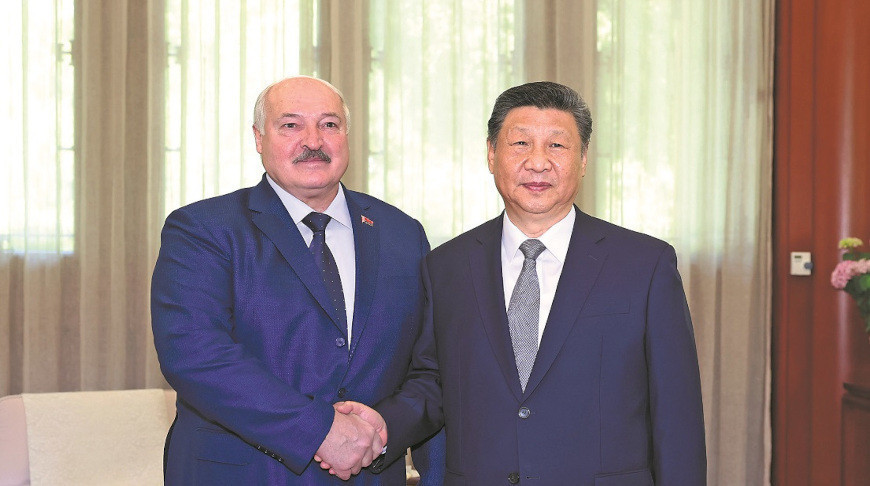
President Xi Jinping meets with Belarusian President Alexander Lukashenko in Beijing on Wednesday.
Photo: HUANG JINGWEN/XINHUA
BEIJING, 5 June (BelTA - China Daily) - China and Belarus vowed on
Wednesday to work together to oppose hegemony and unilateralism and
jointly defend international fairness and justice, while striving to
enhance bilateral ties.
President Xi Jinping and Belarusian President Alexander Lukashenko made the commitment during their meeting at the Zhongnanhai leadership compound in Beijing.
Xi highlighted that China and Belarus are true friends and good partners, and said the two countries have always treated each other with sincerity and trust.
The traditional friendship between the two nations has grown stronger over time, and their political mutual trust is unbreakable and their cooperation in various fields is making steady progress, he said.
Noting that China has always viewed and developed its relations with Belarus from a strategic and long-term perspective, Xi expressed China's willingness to work together with Belarus to promote the steady and sustained growth of bilateral relations and mutually beneficial cooperation.
He underlined the need for both countries to further strengthen coordination and cooperation within multilateral frameworks, such as the United Nations and the Shanghai Cooperation Organization, jointly oppose hegemony, bullying and coercion, and uphold international fairness and justice.
Lukashenko was reported to have arrived in Beijing on Monday for a three-day visit. This is his first visit to China since he was reelected as Belarusian president in January, and also the 15th time he has visited China since 1994, when he began his first presidential term.
During the meeting, he told Xi that each time he visits China, he deeply feels the profound friendship of the Chinese side.
He said that Belarus appreciates China's long-standing strong support and assistance, highly trusts China, and will steadfastly develop relations with China and actively promote cooperation with China.
Lukashenko commended China's role in international affairs, saying that it firmly upholds multilateralism and opposes unilateralism, sanctions and coercion, setting an example for the world.
Belarus admires China's stance and is willing to work with it to jointly defend international fairness and justice, he said.
Sino-Belarusian relations have been boosted by mutually beneficial cooperation within the framework of the Belt and Road Initiative over the past years.
The China-Belarus Industrial Park in Minsk, the Belarusian capital, is a landmark Belt and Road cooperation project highly valued by the leaders of both countries and actively promoted by the two governments.
With a total area of 112.5 square kilometers, the industrial park is China's largest overseas economic and trade cooperation zone. It prioritizes the development of key sectors, such as electronic information, biomedicine, fine chemicals, high-end manufacturing, and logistics and warehousing. As of the end of last year, it housed 142 companies.
On May 21, China and Belarus held the sixth session of their intergovernmental cooperation committee in Minsk. During the meeting, the two sides signed cooperation documents on the digital economy and scientific and technological innovation, agreeing to establish a new subcommittee on industrial cooperation.
At a meeting with representatives of the Chinese business community in Beijing on Tuesday, Lukashenko said that technological modernization of the manufacturing industry is one of the major issues on the Belarus-China agenda, Russia's TASS news agency reported.
Wang Xiaoquan, a researcher at the Institute of Russian, Eastern European and Central Asian Studies at the Chinese Academy of Social Sciences, said that Lukashenko's primary goal for this trip is to comprehensively strengthen bilateral relations and strategic cooperation in the new circumstances, particularly to enable Belarus to better leverage cooperation with China to boost its modernization.
In the field of economic and trade cooperation, Belarus is eager to introduce China's technologies in manufacturing, thereby achieving leapfrog development, Wang was quoted by the Global Times as saying. China and Belarus are expected to further leverage the leading role of the China-Belarus Industrial Park to create a number of flagship projects, he added.
President Xi Jinping and Belarusian President Alexander Lukashenko made the commitment during their meeting at the Zhongnanhai leadership compound in Beijing.
Xi highlighted that China and Belarus are true friends and good partners, and said the two countries have always treated each other with sincerity and trust.
The traditional friendship between the two nations has grown stronger over time, and their political mutual trust is unbreakable and their cooperation in various fields is making steady progress, he said.
Noting that China has always viewed and developed its relations with Belarus from a strategic and long-term perspective, Xi expressed China's willingness to work together with Belarus to promote the steady and sustained growth of bilateral relations and mutually beneficial cooperation.
He underlined the need for both countries to further strengthen coordination and cooperation within multilateral frameworks, such as the United Nations and the Shanghai Cooperation Organization, jointly oppose hegemony, bullying and coercion, and uphold international fairness and justice.
Lukashenko was reported to have arrived in Beijing on Monday for a three-day visit. This is his first visit to China since he was reelected as Belarusian president in January, and also the 15th time he has visited China since 1994, when he began his first presidential term.
During the meeting, he told Xi that each time he visits China, he deeply feels the profound friendship of the Chinese side.
He said that Belarus appreciates China's long-standing strong support and assistance, highly trusts China, and will steadfastly develop relations with China and actively promote cooperation with China.
Lukashenko commended China's role in international affairs, saying that it firmly upholds multilateralism and opposes unilateralism, sanctions and coercion, setting an example for the world.
Belarus admires China's stance and is willing to work with it to jointly defend international fairness and justice, he said.
Sino-Belarusian relations have been boosted by mutually beneficial cooperation within the framework of the Belt and Road Initiative over the past years.
The China-Belarus Industrial Park in Minsk, the Belarusian capital, is a landmark Belt and Road cooperation project highly valued by the leaders of both countries and actively promoted by the two governments.
With a total area of 112.5 square kilometers, the industrial park is China's largest overseas economic and trade cooperation zone. It prioritizes the development of key sectors, such as electronic information, biomedicine, fine chemicals, high-end manufacturing, and logistics and warehousing. As of the end of last year, it housed 142 companies.
On May 21, China and Belarus held the sixth session of their intergovernmental cooperation committee in Minsk. During the meeting, the two sides signed cooperation documents on the digital economy and scientific and technological innovation, agreeing to establish a new subcommittee on industrial cooperation.
At a meeting with representatives of the Chinese business community in Beijing on Tuesday, Lukashenko said that technological modernization of the manufacturing industry is one of the major issues on the Belarus-China agenda, Russia's TASS news agency reported.
Wang Xiaoquan, a researcher at the Institute of Russian, Eastern European and Central Asian Studies at the Chinese Academy of Social Sciences, said that Lukashenko's primary goal for this trip is to comprehensively strengthen bilateral relations and strategic cooperation in the new circumstances, particularly to enable Belarus to better leverage cooperation with China to boost its modernization.
In the field of economic and trade cooperation, Belarus is eager to introduce China's technologies in manufacturing, thereby achieving leapfrog development, Wang was quoted by the Global Times as saying. China and Belarus are expected to further leverage the leading role of the China-Belarus Industrial Park to create a number of flagship projects, he added.













